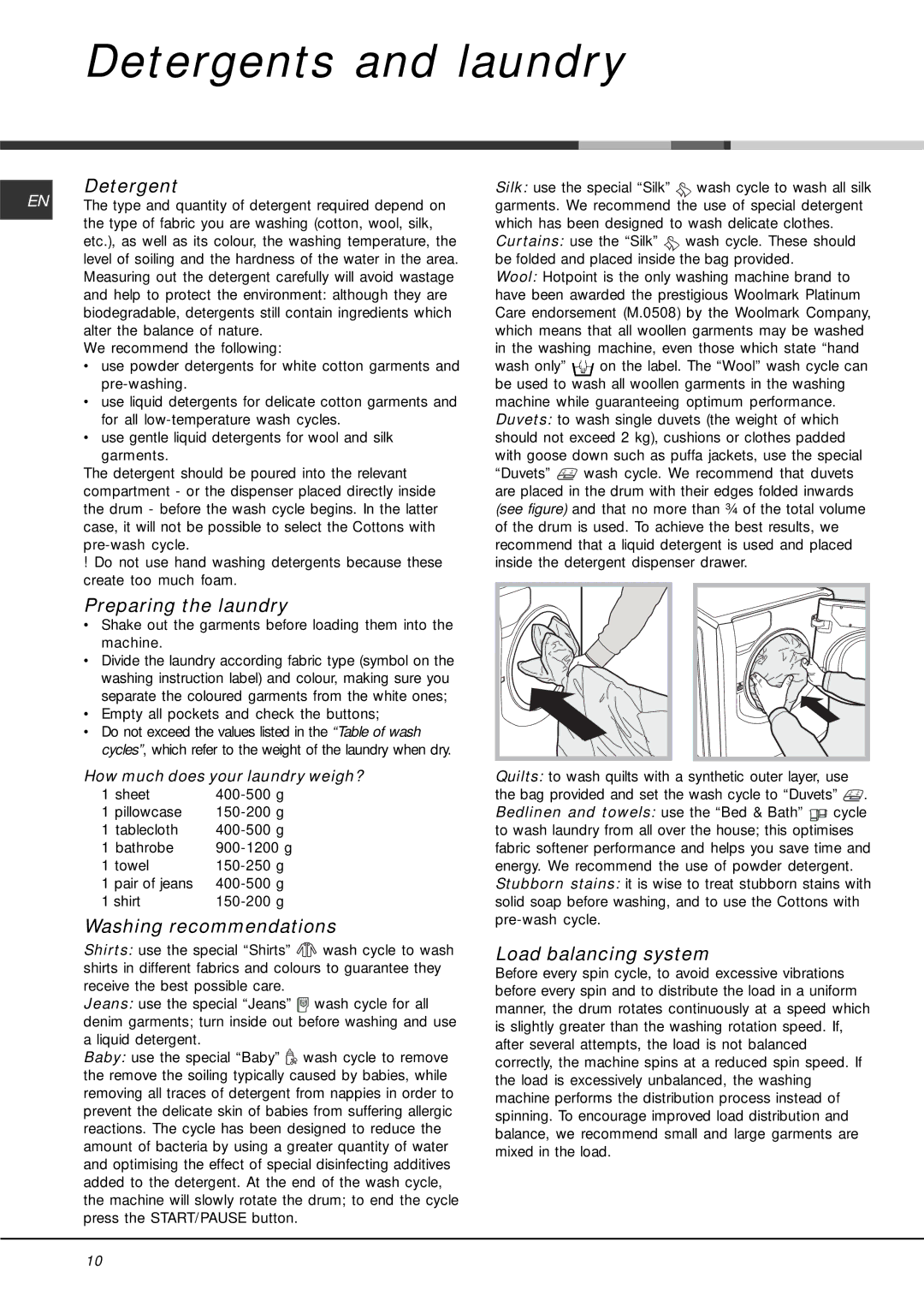
Detergents and laundry
| Detergent | ||
EN | |||
The type and quantity of detergent required depend on | |||
| the type of fabric you are washing (cotton, wool, silk, | ||
| |||
| etc.), as well as its colour, the washing temperature, the | ||
| level of soiling and the hardness of the water in the area. | ||
| Measuring out the detergent carefully will avoid wastage | ||
| and help to protect the environment: although they are | ||
| biodegradable, detergents still contain ingredients which | ||
| alter the balance of nature. | ||
| We recommend the following: | ||
| • | use powder detergents for white cotton garments and | |
|
| ||
| • | use liquid detergents for delicate cotton garments and | |
|
| for all | |
| • | use gentle liquid detergents for wool and silk | |
|
| garments. | |
The detergent should be poured into the relevant compartment - or the dispenser placed directly inside the drum - before the wash cycle begins. In the latter case, it will not be possible to select the Cottons with
! Do not use hand washing detergents because these create too much foam.
Preparing the laundry
•Shake out the garments before loading them into the machine.
•Divide the laundry according fabric type (symbol on the washing instruction label) and colour, making sure you separate the coloured garments from the white ones;
•Empty all pockets and check the buttons;
•Do not exceed the values listed in the “Table of wash cycles”, which refer to the weight of the laundry when dry.
How much does your laundry weigh?
1 sheet | ||
1 pillowcase | ||
1 | tablecloth | |
1 | bathrobe | |
1 towel | ||
1 pair of jeans | ||
1 shirt | ||
Washing recommendations
Shirts: use the special “Shirts” ![]() wash cycle to wash shirts in different fabrics and colours to guarantee they receive the best possible care.
wash cycle to wash shirts in different fabrics and colours to guarantee they receive the best possible care.
Jeans: use the special “Jeans” wash cycle for all denim garments; turn inside out before washing and use a liquid detergent.
Baby: use the special “Baby” ![]() wash cycle to remove the remove the soiling typically caused by babies, while removing all traces of detergent from nappies in order to prevent the delicate skin of babies from suffering allergic reactions. The cycle has been designed to reduce the amount of bacteria by using a greater quantity of water and optimising the effect of special disinfecting additives added to the detergent. At the end of the wash cycle, the machine will slowly rotate the drum; to end the cycle press the START/PAUSE button.
wash cycle to remove the remove the soiling typically caused by babies, while removing all traces of detergent from nappies in order to prevent the delicate skin of babies from suffering allergic reactions. The cycle has been designed to reduce the amount of bacteria by using a greater quantity of water and optimising the effect of special disinfecting additives added to the detergent. At the end of the wash cycle, the machine will slowly rotate the drum; to end the cycle press the START/PAUSE button.
Silk: use the special “Silk” wash cycle to wash all silk garments. We recommend the use of special detergent which has been designed to wash delicate clothes. Curtains: use the “Silk” wash cycle. These should be folded and placed inside the bag provided.
Wool: Hotpoint is the only washing machine brand to have been awarded the prestigious Woolmark Platinum Care endorsement (M.0508) by the Woolmark Company, which means that all woollen garments may be washed in the washing machine, even those which state “hand
wash only” on the label. The “Wool” wash cycle can be used to wash all woollen garments in the washing machine while guaranteeing optimum performance. Duvets: to wash single duvets (the weight of which should not exceed 2 kg), cushions or clothes padded with goose down such as puffa jackets, use the special
“Duvets” ![]() wash cycle. We recommend that duvets are placed in the drum with their edges folded inwards (see figure) and that no more than ¾ of the total volume of the drum is used. To achieve the best results, we recommend that a liquid detergent is used and placed inside the detergent dispenser drawer.
wash cycle. We recommend that duvets are placed in the drum with their edges folded inwards (see figure) and that no more than ¾ of the total volume of the drum is used. To achieve the best results, we recommend that a liquid detergent is used and placed inside the detergent dispenser drawer.
Quilts: to wash quilts with a synthetic outer layer, use the bag provided and set the wash cycle to “Duvets” ![]() .
.
Bedlinen and towels: use the “Bed & Bath” cycle to wash laundry from all over the house; this optimises fabric softener performance and helps you save time and energy. We recommend the use of powder detergent. Stubborn stains: it is wise to treat stubborn stains with solid soap before washing, and to use the Cottons with
Load balancing system
Before every spin cycle, to avoid excessive vibrations before every spin and to distribute the load in a uniform manner, the drum rotates continuously at a speed which is slightly greater than the washing rotation speed. If, after several attempts, the load is not balanced correctly, the machine spins at a reduced spin speed. If the load is excessively unbalanced, the washing machine performs the distribution process instead of spinning. To encourage improved load distribution and balance, we recommend small and large garments are mixed in the load.
10
